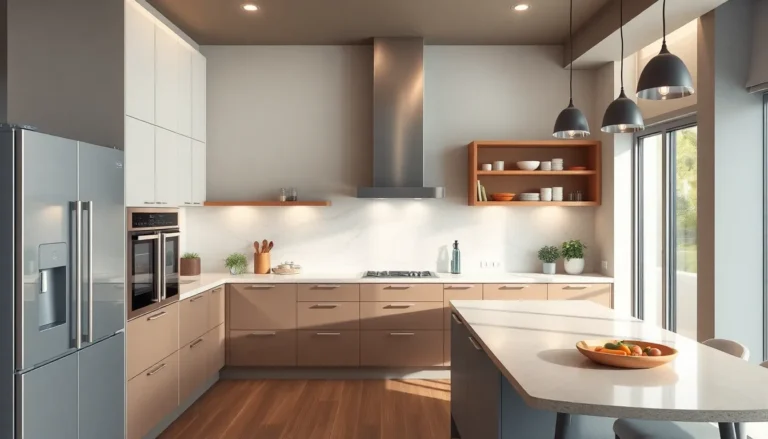Buying a home can feel like a thrilling roller coaster ride—full of ups, downs, and the occasional scream of panic. On one hand, owning a home offers stability and the chance to finally paint the walls that hideous shade of avocado green. On the other hand, it comes with responsibilities that might make even the most organized person break into a cold sweat.
Before diving headfirst into the housing market, it’s essential to weigh the pros and cons. Is that dream kitchen worth the mortgage payments? Can the backyard BBQs compensate for the leaky roof? This article explores the highs and lows of homeownership, helping potential buyers navigate the maze of decisions with a smile—and maybe a few laughs along the way.
Table of Contents
TogglePros and Cons of Buying a Home
Buying a home offers numerous benefits that attract many potential homeowners. Stability tops the list, providing a sense of permanence that renting often lacks. Homeownership allows for personal expression, enabling homeowners to customize spaces according to their preferences. Building equity presents another significant advantage, as monthly mortgage payments contribute to personal wealth over time.
Despite these advantages, challenges remain. Maintenance responsibilities can burden owners, requiring both time and financial investment for upkeep. Market fluctuations create risks, with home values potentially declining, impacting investment security. Relocation becomes more complex as well, as selling a home can take longer than expected, limiting flexibility.
Tax implications exist. Homeowners may benefit from tax deductions on mortgage interest, but they should also consider property tax expenses. Additionally, upfront costs like down payments and closing fees can strain finances.
Weighing these factors is crucial for anyone considering homeownership. The benefits of stability and equity often appeal strongly to buyers, while the responsibilities and financial implications can cause hesitation. Being informed about both sides aids in making a balanced decision.
Benefits of Home Ownership

Homeownership offers significant advantages, enhancing both financial stability and personal satisfaction. The most notable benefits include building equity and achieving stability and predictability in living situations.
Building Equity
Equity represents ownership value in a home. Homeowners build equity over time as mortgage payments reduce the loan balance and property values increase. This accumulation can provide financial leverage for future investments. For example, a home originally purchased for $250,000 may appreciate in value to $300,000, yielding $50,000 in equity. Home equity can also serve as a source for loans, enabling renovations or funding other financial needs while avoiding high-interest debts.
Stability and Predictability
Stability arises from fixed-rate mortgages, which offer consistent monthly payments. Homeownership removes the uncertainties of rental market fluctuations, providing a sense of security. Many homeowners enjoy the freedom to personalize their space, creating a home that reflects their style and values. Long-term residency fosters community connections, enhancing social relationships and engagement. Predictable housing costs enable better budgeting, contributing to overall financial health.
Drawbacks of Buying a Home
Homeownership comes with significant drawbacks that potential buyers should carefully consider.
Financial Commitment
Buying a home requires a substantial financial commitment. Initial costs include down payments, which typically range from 3% to 20% of the home’s price. Ongoing expenses encompass mortgage payments, property taxes, homeowners insurance, and maintenance costs. These financial obligations can strain budgets, particularly for first-time buyers. Market fluctuations can affect property value, resulting in potential losses if a homeowner needs to sell during a market downturn. An example of this can be seen when a home bought for $300,000 depreciates to $250,000, leaving the owner with little to no equity.
Maintenance Responsibilities
Owning a home means taking on maintenance responsibilities. Homeowners must manage repairs, upkeep, and regular maintenance tasks, which can become time-consuming and costly. For instance, properties often require routine inspections of plumbing, roofing, and electrical systems to ensure safety. When problems arise, such as a leaking roof or broken HVAC system, homeowners bear the full financial burden of repairs. Property maintenance can cost between 1% and 4% of the home’s value annually, adding to the overall expenses of ownership. Such responsibilities often lead to unexpected challenges, especially for those unprepared for DIY tasks.
Factors to Consider Before Buying
Evaluating key factors is crucial before purchasing a home. Homebuyers need to analyze market conditions and their personal financial situations.
Market Conditions
Market conditions impact home prices and availability. Interested buyers should examine current trends, including supply and demand in their desired locations. For example, a seller’s market often leads to higher prices and fewer homes on the market, making it competitive. In contrast, a buyer’s market typically results in lower prices and more options. Anticipating economic indicators like interest rates also guides buyers. When rates remain low, it encourages home purchasing, but rising rates can affect affordability. Staying informed about local real estate trends ensures buyers make educated decisions.
Personal Financial Situation
Personal financial situations dictate homeownership feasibility. Assessing monthly budgets, existing debt, and credit scores provides insight into borrowing capacity. A solid credit score often results in better mortgage rates, leading to lower overall costs. Down payments vary significantly, requiring savings up to 20% of the home’s price. Overlooking additional costs like property taxes, insurance, and maintenance can strain financial resources. Creating a realistic budget that factor in all expenses aids in shaping a sustainable homeownership plan. Understanding these financial aspects enables potential buyers to select a property aligning with their financial goals.
Alternatives to Buying
Exploring alternatives to buying a home offers flexibility and less financial burden. Several options can suit various lifestyles and situations.
Renting
Renting serves as an appealing choice for many. Individuals enjoy the freedom to relocate without the commitment of homeownership. Monthly rent generally ranges from $1,200 to $2,500 depending on location and property type. Tenants benefit from predictable expenses, as landlords usually cover maintenance and repairs. While renting doesn’t build equity, it can provide more liquid assets for investments or savings for future goals. Additionally, the rental experience allows individuals to test neighborhoods before committing long-term.
Co-Housing Arrangements
Co-housing arrangements offer an innovative living solution. Multiple individuals or families share communal spaces while maintaining private living areas, typically reducing costs significantly. Shared expenses for utilities, property taxes, and maintenance create a collaborative financial model. This setup also fosters a sense of community, enabling residents to enjoy social interactions and support systems. Co-housing appeals to those valuing both privacy and community, often leading to lasting relationships among neighbors. Flexibility and a lower financial commitment position co-housing as an attractive option compared to traditional homeownership.
Buying a home is a significant decision that comes with its own set of rewards and challenges. While it offers stability and the chance to build equity it also requires a commitment to ongoing expenses and maintenance. Understanding the emotional and financial implications is essential for making an informed choice.
For some individuals the flexibility of renting or exploring co-housing arrangements might be more suitable. Ultimately it’s about aligning personal goals with financial realities. By weighing the pros and cons potential buyers can navigate this complex journey with confidence and clarity.




